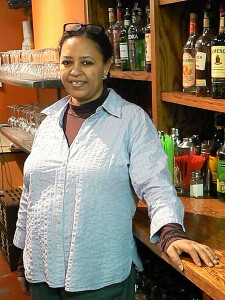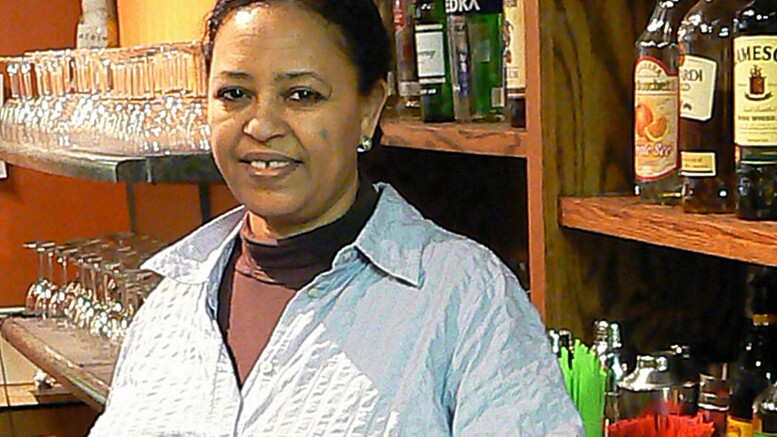Seek parity in immigration reform
This article was originally published for Chicago Is The World
By La Risa Lynch
It’s lunch time and Ethiopian Diamond is jumping with customers even as construction crews hammer away doing renovations to the Edgewater restaurant.
Owner Almaz Yigizaw credits the restaurant’s success to recreating her grandmother’s recipes that she remembers growing up in Ethiopia.
“We really try to cook like home,” said Yigizaw who emigrated to Chicago at age 15.

Almaz Yigizaw
She and an older brother fled Ethiopia when that East African country’s communist government cracked down on pro-democracy demonstrators. Many youth were jailed, killed or tortured by the government, Yigizaw recalled.
“It was scary to leave because we never traveled five miles away from home. We had to walk all the way to the Sudan,” Yigizaw said, noting that people died of hunger and thirst along the way.
They crossed the desert with other youths to reach neighboring Sudan, traveling by night to avoid being shot by police. Six months in a Sudanese refugee camp, Yigizaw finally arrived in Chicago.
African Enterprise in Chicago
Her success as an African immigrant business woman is not lost on her. When she arrived in Chicago in 1982, she only had the shoes on her feet, two pairs of underwear and a bra. Adjusting to her new life was hard, but hard worked paid off.
“Here in the United States, you have a lot of choices,” said Yigizaw, who studied microbiology in college before opening the restaurant in 1996. She opened a second location in 2010 on Howard Street. “You can work. You can go to school. You just have to make good decisions.”
Yigizaw represents a growing African immigrant population, whose entrepreneurial spirit is adding to the vibrant mix that makes Chicago one of the most ethnically and cultural diverse cities.
African-owned businesses are transforming Chicago’s business landscape. Neighborhoods are dotted with African-owned restaurants, retail shops to hair braiding salons, and social service agencies that cater to their needs.
For Yigizaw, these businesses present an opportunity for people to learn more about Africa. She said most people still think of Africa as wild and war-torn.
“We are really changing the image of people in Chicago about Africa,” she said. “Africa has a lot to offer.”
Chicago is unique in its ethnic diversity. Of the 54 countries that make of the African continent 49 are represented in the city, an feat unheard of in other metropolitan cities, said Alie Kabba, executive director of the United African Organization, a nonpartisan coalition of African-community organizations.
Many African immigrants tap into that entrepreneurial spirit to achieve that American Dream and establish roots here. Kabba noted that nearly all African owned businesses — 9 out 10 — opened between 1995 to 2005. That decade, he said, saw unprecedented numbers of Africans migrating to the U.S.
Even African entrepreneurs are helping their homeland by opening up trade between the U.S. and the continent. Kabba noted that seven of the 10 fastest growing economies are on the continent.
“We are seeing in many areas of life that African immigrants are contributing immensely to make this city a truly global city,” Kabba said.
The contributions Africans as well as other immigrant communities show the positive impact immigration policies have on the US, but that could be in jeopardy.
Immigration Reform and Africans: A Setback
A causality of the latest version of the Senate’s immigration reform bill was the diversity visa program, a vital option that allowed Africans to emigrate to the U.S. The Senate’s Gang of 8 eliminated the 55,000-slot program, a program where nearly half of all African immigrants use to come to this country. Last year, 24,000 Africans came here on the diversity visa program.
“It would definitely mean that Africa would negatively be impacted in terms of the number of people who can leave the continent and come to the U.S. as immigrants, ”Kabba said.
The diversity visa program, he added, offered the best chance for Africans to come to the US since the continent has very few options for people to emigrate here.
Ending the program will throw the African immigrant population back to 1965 numbers where Africans in the U.S. “would be just like drops of rain in the desert,” Kabba said.
“Historically before 1965 Africans could not come to this country as immigrants,” he explained. “One of the great achievements of the Civil Rights Movement was the democratization of U.S. immigration to make it easier for Africans to come here.”
While most Africans come here through family reunification programs or seeking refugee or asylum status, there are a mall number of undocumented Africans. His group wants parity for these immigrants. He noted several African immigrants don’t have legal status because they overstayed their visas.
Many, Kabba said, come to this country for school or business but war or political strife prevented their return. Off the 11 million undocumented immigrants in the US, four percent are Africans while seven percent are from the Caribbean. The process to gain legal status should be streamlined where from people from Africa have the same options as people from Ireland, he added.
“That is why we need a system that is fair to all regions of the world …,” Kabba said. “Nobody wants to come here and intentionally overstay their visa if there is a path for them to have permanent residency.”
That path will bring a lot of undocumented immigrants including Africans out of the shadows, says UAO board member Godfrey Chinomona. Chinomona, a native of Zimbabwe, gained his American citizenship in 2011 after a technology staffing firm sponsored his work visa in 2000.
He said many stay in the shadows for fear of being deported or the stigma of being an illegal immigrant. Immigration reform means a lot of people will come out of their “cocoons and start contributing,” said Chinomona, owner of AceXtic Consulting, an IT consulting and staffing company.
He said many Africans are highly educated but are stuck in menial jobs like home health care because they don’t have papers.
“Sometimes they are forced to change their expectations,” Chinomona said.
But he contends immigration reform is somewhat biased. He noted bills coming out of Congress favor Latinos and rarely considered other ethnic groups. Africans, he said, must be more organized to be part of the dialogue on immigration reform.
“We have not had a lot of coming together to really push our interests,” he said. “A lot of people just come here to work and they isolate themselves. They don’t understand you have to mobilize your community and set an agenda.”
The United African Organization will hold its 7th annual Chicago African Summit and Resource Fair, May 18th at 700 E. Oakwood Blvd. For more information: http://www.eventbrite.com/event/5162669684#

Be the first to comment on "African Immigrants shape Chicago’s business landscape"